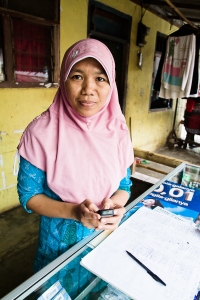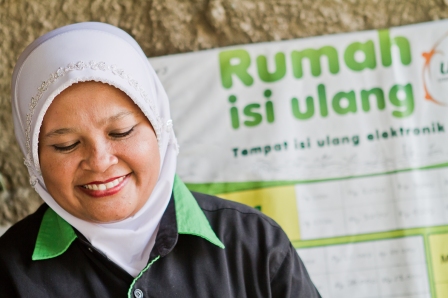By Sean Paavo Krepp, Uganda Country Director

Last week the mobile and internet world converged on Barcelona for its own Oscars: the Global Mobile Awards. Hosted annually by the GSMA – the umbrella organization for mobile operators worldwide – it’s the place to preview all the new apps, services and devices coming on the market.
I had the honor of participating as a judge for the mWomen Best Mobile Product or Service for Women in Emerging Markets award. The GSMA introduced the award in 2012 to address the staggering gender gap in mobile phone use (PDF), especially for rural poor women. The mobile industry responded with a growing number of new services – tapping a business opportunity the GSMA estimates to be about $13 billion.
As Bill Gates rightly points out in his Annual Letter: “setting clear goals and finding measures that will mark progress toward them can improve the human condition.” And the mWomen Initiative at the GSMA has done exactly this to measure and draw the industry’s attention to the barriers to uptake as well as recognize trailblazers.
M-powering Women
Women play a fundamental role in poor households. They are often the largest contributors to farm production and food security, and they often act as the custodians of healthcare, education and financial planning in the family. So reaching them with vital information and financial services can be a key catalyst in alleviating and reducing poverty.
In our 10 years of product and service user-centered design work with the rural poor, Grameen Foundation has identified some key barriers to uptake. There are three important barriers that guided my votes for this year’s mWomen nominees.
Power Relations
The most striking observation pertains to power relations in the household. In rural households, men often control the assets in the home and do not welcome mobile phone usage. In fact, 74 % of 2500 women surveyed by the GSMA in four developing countries found that women did not own a phone because their husbands would not allow it. Furthermore, 82% of married women who did own a phone said it made their husbands suspicious.
The key learning is that a segmentation strategy needs to address both men and women when discussing mobile uptake. In our work with PT Ruma and Qualcomm in Indonesia we made it mandatory for men to sign the micro-franchise agreement and encouraged cross gender dialogue on the benefits of starting a Ruma business.
Confidence and skill
Many women also lack self-confidence and, in many cases, they also lack the literacy and numeracy skills needed to operate a phone. Those that own phones often use only voice with little use of SMS and almost no usage of smartphone services.
We have found that using intermediaries – whether mobile enabled MFIs, mobile health workers or Community Knowledge Workers (CKWs) – helps to overcome these barriers to access. Technology alone is not enough and having an early adopter or role model train others and contextualize products or services can form an important bridge to the rural household.
It is also important for operators to design marketing campaigns and collateral that focus not only on what they are offering but also how it works. Educating the market needs to be balanced with building awareness in this emerging segment.
A recent Grameen Foundation case study on a collaboration to reach women savers over the mobile phone through Cashpor, found that – especially with sensitive financial services delivered over the phone – a microfinance institution can play an important role in helping women overcome barriers to access. Interestingly, it noted that the children in the households were earlier adopters of the technology and could support women as they learn to use new products and services.
Furthermore, we have found that the best recruiters of women are themselves women. It builds confidence when women see a community leader – someone like me – become a role model. PT Ruma recruits only women, our MOTECH work in Ghana focuses on midwives and our CKW program has built a strong gender strategy to encourage women micro-entrepreneurs to take up our micro-franchise business in a box.
Cost
Finally, the affordability, relevance and ease of use of products and services are key drivers for uptake. Sometimes counter-intuitive gender differences exist, making research and user-centered design absolutely important.
For example, I recently participated in a user-centered design co-creation workshop for a mobile commitment savings product in Uganda.
When men and women were asked about the service both were very sensitive to price and concerned about the fees. But, when it came to liquidity, women wanted greater access to their savings and fewer penalties for early withdrawal.
When we probed further, the men said it was hard to hold on to money especially on weekends, while women said they often needed fast access to cash when their family or children fell sick.
And the winner is….
This year’s award went to Asiacell for its Almas Line, which provides mobile services to women in Iraq. It used consumer insights data to design a suite of services tailored to the women’s needs. Of note was a free service that allows women to block calls or texts from potential harassers.
The most compelling aspect of the Asiacell service was a television campaign that targeted women but also spoke to men by portraying the services as linked to deep traditional values. Asiacell’s women subscribers grew to 3.5 million within 16 months – just as many female customers as it had in its first 11 years of operations. This clearly demonstrates that consumer insights, a solid offering focused on women, and creative excellence can help drive usage of mobile services.
I was honored to be a judge at the GSMA Awards and to serve on the esteemed GSMA mWomen Panel. The GSMA has done an excellent job in highlighting the needs of the poor, especially women, and has shown the business benefits of bridging the gender gap, as well as the strong potential for social impact of the use of mobiles among women.











